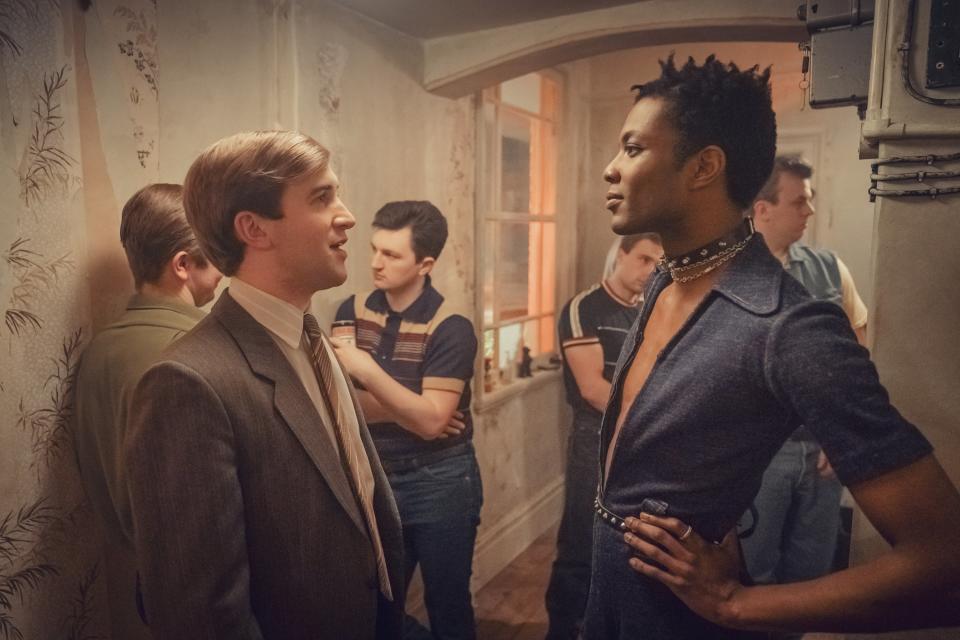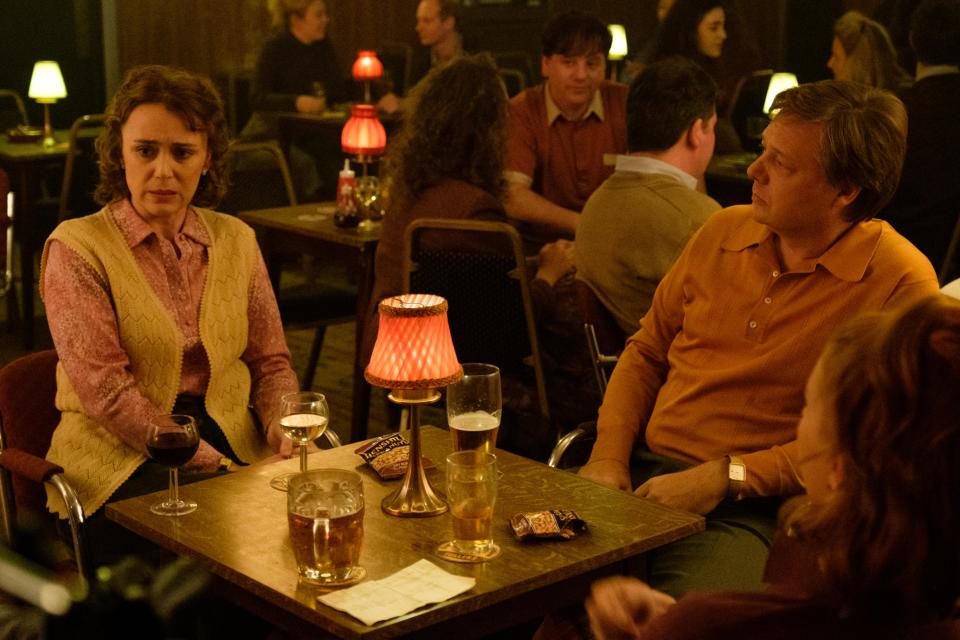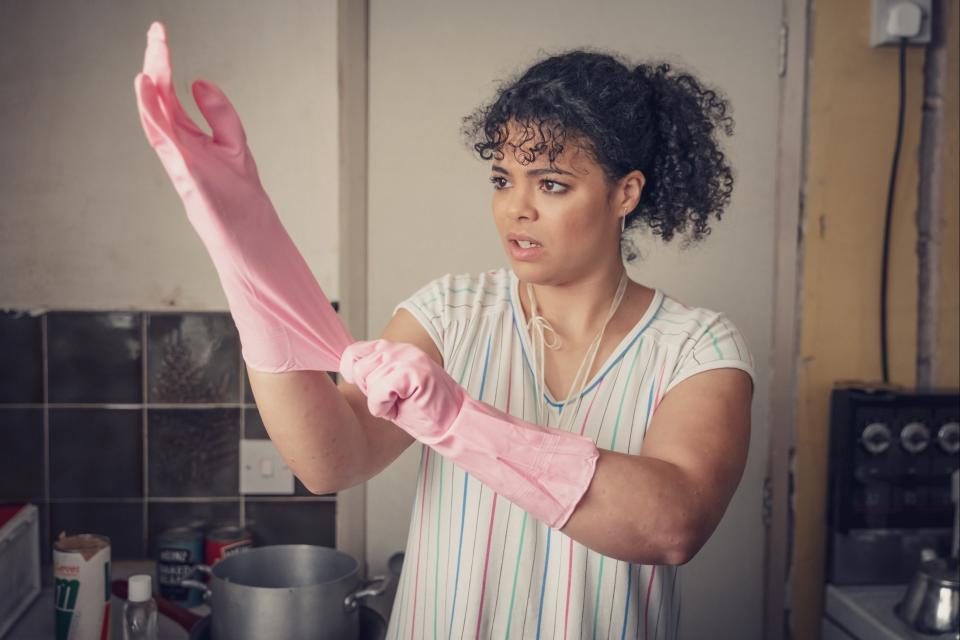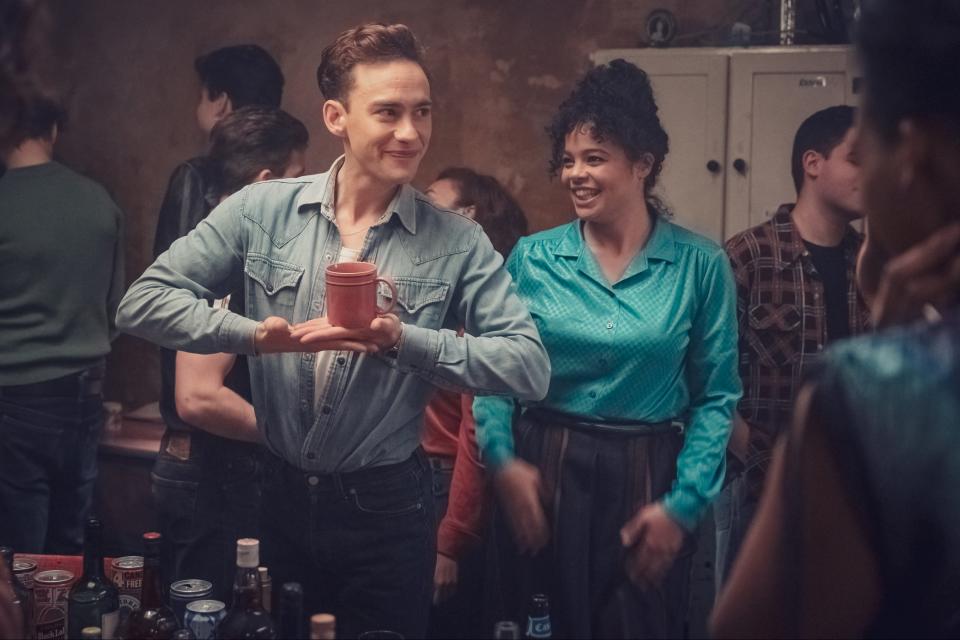It’s a Sin writer Russell T Davies on why women and the West End are the unsung heroes of the Aids crisis

Olly Alexander and Lydia West play best pals Ritchie and Jill
(Channel 4)It has taken Russell T. Davies a long time to pen his new five-part Channel 4 drama, It’s a Sin. Decades, says the writer, now 57, during which he simply wasn’t ready to face its subject matter. Starting in 1981 and focusing on a group of young gay men living in London throughout the decade in which Aids ravaged their only recently legal community (and that barely - the age of consent for homosexual sex was only lowered from 21 to 18 in 1994, to 16 in '99), the series, is vintage Davies: funny, riotous and joyful but also shocking, sad and ultimately devastating. By the final credits I was heaving sobs at the sheer waste of life and promise.
The cast is made up mostly of male gay actors (Davies said recently that he is currently of the opinion that gay actors should play gay characters, though he later remarked that he felt “different five years ago – and I might change my mind in five years”) including the singer and actor Olly Alexander in the leading role. Ritchie Tozer is a gay, 18 year-old aspiring actor who moves to London from the Isle of Wight and behaves, as you might expect, like a kid in a sweetshop.

Ritchie quickly finds an exuberant, group of friends - the unapologetically camp Roscoe (Omari Douglas), from a Nigerian family; gorgeous drama hunk Ash (Nathaniel Curtis); the sweet, reserved Welshman Colin (Callum Scott Howells) always dressed in an immaculate suit as befits a tailor’s assistant - but always at the centre is his best mate, Jill.
Played by the luminous Lydia West, she’s based on another Jill, the actress Jill Nalder, whom Davies met aged 13 at Youth Theatre in Wales and who is one of the “unsung heroes”, says Davies, of the movement to bring the terrors of Aids out into the open; to educate the public and to support those suffering from the disease. For Davies, as much as It’s a Sin is a tribute to all those beautiful, lost boys, it’s also a love letter to the women who stepped up with unconditional love where even some mothers couldn’t or wouldn’t do so.
“She won’t take it,” he says, when I Zoom the two friends together at their respective homes (at this point Nalder’s technology has failed her, allowing Davies to sing her praises undisturbed). “‘Everyone was doing it’, she says, ‘it was all of us’ - and it wasn’t. It was a very exceptional bunch of people that did those things and she's at the front of them. She's amazing.”
Nalder - who plays Jill’s mum in the drama - came from a “open minded, very accepting” family. “I didn't have a problem saying about my friends [that they were gay]. But of course, I wasn't saying it about me.”
“You did have a gay-friendly mum,” Davies interjects. “Heading towards the age of 18, once we started up those parties, we woke up over at each other's houses. And that was your mum, making a bacon sandwich and putting the kettle on.”

His own mother, though supportive, was “a little bit more reserved. She wasn’t surprised, she probably could have told me when I was five, but it was an unfamiliar world to her.” And when he started coming out, “aged about 21, there was a virus coming too, so all of us weren’t only coming out but also saying, and by the way, I’m not ill. And I promise not to get ill, but no one was really sure how you did get ill, at the time.”
The ignorance that surrounded the transmission of HIV comes out starkly in the drama, which airs from Friday. It’s hard now to countenance just how little was understood, and how hard it was to come by information. “There was a good 10 years, maybe more, when people were asking, ‘can you get it from oral sex?’" Davies says.
“There was definitely a thing of: can you get it from kissing? You can only be ‘dry kissing’,” Nalder adds. “They’d say you couldn’t have any bodily fluids, you could get it through your eyes. And on top of that the fear that you might have it. Some people would get these kaposi sarcoma marks on their bodies, so everyone would look at a little spot and think, ‘My God, is that it?’ It was a mire of confusion.”
Some early patients were locked away unlawfully, with their food left at the door by fearful medical staff until a family member came and carried it through. It wasn’t helped, she says, by the fact that even among the medical community, “knowledge was so limited as to what happens when you have no immunity”.
“I think it's the first time we started using the word ‘immunity’, really, culturally,” agrees Davies. “It was like, ‘what do you mean I’ve got an immune system?’”

In some cases, the dizzying variety of illnesses that could attack an HIV patient, perversely, helped to hide the truth. “I remember someone saying about a friend of mine, when it looked like he had a lymphoma: ‘So that probably means you can tell his parents, because anyone could die of a lymphoma’,” Nalder says. Another friend kept up the pretence, even with her, that his cancer had occurred by chance, for three years. “Then he called me from the hospital and I went to visit and they asked me, ‘are you So-and-so’s friend’ - and I knew, I knew I was on an Aids ward. And I went in and I said, ‘you don’t have to tell me. The penny’s dropped.’”
“There were men in those beds dying all alone, and some of them didn’t even tell their friends, even their gay friends. There was so much shame attached to the whole thing,” Davies says.
Even those men who had love around them needed extra support. “You need some way to control the visitors,” Davies laughs. “Some beautiful boys would have had 100 visitors a day and someone has to take charge, and say no, one at a time, please. It's a difficult thing, a bedside. I've done that for my own husband, when he was dying [Andrew Smith died from cancer, at home, in 2018]. It's a lot of work, controlling the visitors all day long. In a lovely way, it's no hardship, but it's work. You can't just let the situation run out of control.”
He grieves that he was unable to work in to his script any of the lesbian stories of the time. When nursing staff were still afraid, “it was specifically lesbian nurses who stepped forward and did extra shifts, who held those hands and mopped those brows and emptied the bedpans and did the work.” And I’m naively stunned when he tells me about lesbians who contracted Aids in the Eighties, “because there are some lesbians who like to have penetrative sex, right? And if they're going to have penetrative sex, they're more likely to go to their mate the gay man, than a straight man. And that's how it was passed on to them. And so they had to lay in those beds, with enormously complicated levels of shame.”
Ah yes, the shame. One character in the drama spouts conspiracy theories and continues to have unprotected sex even after he’s sure he’s infected, through shame, fear, and disbelief. Although Davies was lucky, and never became infected, “that was me,” he admits. It became harder to deny, he says, when he started to see increasing coverage in the newspapers.

Once he’d accepted what was happening, “I did my bit, you know, I gave money, I’d go to charity events. I had friends who died and I hope I was kind. I mean, you're stupid, when you're young. But I certainly wasn't at the forefront of Aids activism in the way that Jill was.”
A hotbed of early activism, says Davies, was Nalder’s home turf of London’s theatreland (in the drama, we see her singing in the chorus of Les Miserables before racing off after work to man the phones at an HIV information hotline). “In this fight, as the activism began, I think what gets left out of the story is the West End,” he says. “So many actors were gay, there were so many people falling ill that actually, the early start of activism was in those chorus lines. To this day, the West End is a powerhouse, it's still a focus of HIV fundraising. But in those early days, you were the ones who came together, you were the frontline,” he says to Nalder.
“People really did pull together,” Nalder agrees. In the early Nineties, following the success of Broadway’s Equity Fights Aids campaigns, “about 10 of us tried to set that up in London, with various West End shows, big shows that were ongoing and could do late night cabarets - and sometimes a Broadway celebrity would be part of the show. Late night performances raised a lot of money."
“The lawyers are wary about naming names,” adds Davies, “but there were producers, West End producers and directors who were magnificent, and created jobs for people who were ill, which weren't really jobs. There was a desk at the corner, it was like - you just go and be ill, and we’ll pay you a wage. They did extraordinary things.”

In the face of this kind of care, what place is there for forgiveness of those who were not so kind? There’s a scene late in It’s a Sin where a devastated Jill tears a strip off a dead boy’s mother, telling her that it was the shame she instilled in him that caused him to block out what was happening, and potentially to kill others. It’s bleak, but it’s hard to argue with. Do those parents, who rejected their children or made it clear that their ‘lifestyle’ was unacceptable, deserve forgiveness, I ask them? Davies is unequivocal.
“Yes! Some people acted terribly but has one of us not done that?” When Smith died, “there were some people who handled that really badly, who didn't write or don't mention him. But I remember times I didn't write. I know people who died. I meant to write to their parents, and I didn't, because I was too young and too stupid to do it. We've all been that idiot.”
Ultimately, he thinks, “you have to be kind. And if their son has died, they are allowed to behave in any way they want, actually, that is the truth.”
Nalder agrees. “I think in all but the worst of cases, people certainly loved their son, but they didn't understand. And it became too much to take in, when someone is dying. There was love, and the wish to understand, but not the time to do that,” she says. “No friend of mine that I know, would want to hold anything against the parents that they loved.”
As for those who “did terrible things, who completely disowned their children - they don't need my wise words to feel bad,” says Davies. “They were already living in some sort of hell, they're not happy with what they did. There was no rest in their hearts, there was no contentment, there was no peace. I don't need to do a thing. I think if anything, you want to reach out to them and say, ‘Come here, come talk. Let down your barriers. It's alright.’”
It’s a Sin starts on Channel 4 at 9pm on Friday January 22

 Yahoo Finance
Yahoo Finance 